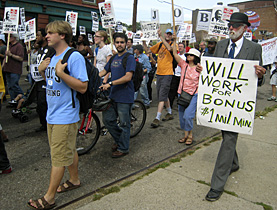
G20 finds Pittsburgh booming in times of bust

On Thursday, United States President Barack Obama will welcome world leaders for a G20 summit in Pittsburgh, an industrial city picked for its recession-proof vitality.
Charles Dickens may have once called it “hell with the lid off” but some Swiss-Americans living in the Pennsylvania city say they’ve been spared the economic meltdown.
Last week the US president called Pittsburgh, population 316,000, “a marvellous city”, a stark contrast to its old image as a dirty place of smog, steel and smelters.
“Pittsburgh is a bold example of how to create new jobs and industries while transitioning to a 21st century economy,” Obama said ahead of the G20 meeting that runs until Friday.
“In a place known as the city of bridges, we can come together to advance our common interest in a global recovery.”
In the years between Dickens and Obama Pittsburg has undergone a transformation. Steel declined, cleaner industries arrived and authorities cleaned up decades of pollution. G20 leaders will undoubtedly notice the payoff. Even in this economy, business is strong.
Island of prosperity
Indeed, Pittsburgh is something of an islet of prosperity. It figures among the ten cleanest cities of the world, comparable to Geneva. Unemployment is two percentage points lower than the nationwide average.
The city’s makeover has made it the number one city in the US and 29th in the world for the best quality of life, according to The Economist magazine.
“Pittsburgh is less industrial and more intellectual,” says Conrad Ausertag, son of a Basel immigrant and former smelter employee. The city air was once so dirty he’d bring an extra shirt to work to change into midday. “We are trying to use our heads instead of our hands.”
Ed Graf, a hotel owner whose grandfather came from Winterthur, says the transition hasn’t been all good. The city lost half of its population after steel factories began closing. Workers’ rights that unions had fought to obtain then disappeared.
“The city was totally restructured,” he said. “Many jobs were created in services and health, but wages are lower than those of steel. Steel also offered jobs to the uneducated and now those people are having a hard time finding work.”
Crisis? What crisis?
But Graf’s hotel, Le Priory, knows no crisis. “We’re doing better than last year and we expect to expand,” he said.
Nor has the recession had a huge impact on Acutronic, a sister company of a Bubikon-based firm in canton Zurich that specialises in flight-motion simulators. The company works in the defence industry, and fighting in Iraq and Afghanistan have contributed to increased orders from the Pentagon.
“We have hired 20 per cent of our 50 employees over the past year,” said Dominique Schinabeck, a dual national who heads Acutronic-USA. “And our turnover increased by more than 30 per cent over the same period.”
The company has benefited from the slowdown in other ways, too. Recently unemployed engineers have been sending in applications for work.
“We are approached by more sub-contractors and they are more willing to reduce their rates,” she added.
Welcome to the G20
Schinabeck, like others in the host city, welcome the G20. Graf does too. “It will give Pittsburgh a boost, more visibility,” he said. “That’s good, because the city was not considered important for a long time.”
As for recovery measures, Graf says he hopes the meeting will focus less on preventing banks from becoming too big and more on ways to help small businesses. He said he would have liked Obama’s economic recovery plan more if it had included tax cuts for companies like his hotel.
Schinabeck feels differently, especially about banks. “In general I am not for [the control of bank capital], but if banks were more regulated before the crisis, we would not be in the mess in which we are now,” she said.
She fears the recovery plan could undermine the defence sector, one of the few sectors – along with health and public service industries – that has been relatively well off despite the recession.
“Because of the recovery plan, many cuts were made in the defence budget,” Schinabeck said. “If the next budget includes further reductions, we could feel a big impact.”
Marie-Christine Bonzom in Washington, swissinfo.ch (Adapted from French by Tim Neville)
Topics to be discussed September 24-25:
1. Increased transparency and accountability
2. Improvement of good regulation
3. Promotion of integrity in financial markets
4. Strengthening international cooperation
5. Reform of international financial institutions
Population: 316,000 people, about half as many as in its heyday of the 1950s.
Diversity: Former American steel capital. Economy now centres on services, robotics, biotech, green technology, education, research and tourism.
Unemployment: 7.7%, two percentage points below the US average.
Quality of life: Forbes magazine says Pittsburgh is on par with Geneva for cleanliness.
A Swiss officer in the British Army, Henri Bouquet, named the city in 1758.
Pittsburgh is the second largest city (after Philadelphia) in Pennsylvania, which is one of five states to have the highest density of people with Swiss origins.
Numerous Swiss-American organisations exist in the city, including one founded in 1874.
Ben Roethlisberger, quarterback for the National Football League’s Pittsburgh Steelers, had a great-great-grandfather from the Emmental region of canton Bern.

In compliance with the JTI standards
More: SWI swissinfo.ch certified by the Journalism Trust Initiative

























You can find an overview of ongoing debates with our journalists here . Please join us!
If you want to start a conversation about a topic raised in this article or want to report factual errors, email us at english@swissinfo.ch.